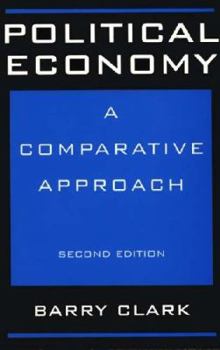Political Economy: A Comparative Approach
Select Format
Select Condition 
Book Overview
This nontechnical book provides a comprehensive and interdisciplinary survey of political economy that can easily be understood by any reader with an introductory-level background in economics. As... This description may be from another edition of this product.
Format:Paperback
Language:English
ISBN:0275963705
ISBN13:9780275963705
Release Date:September 1998
Publisher:Praeger
Length:376 Pages
Weight:0.90 lbs.
Dimensions:1.1" x 6.0" x 9.0"
Customer Reviews
2 ratings
The best break down of political economy ever!
Published by Thriftbooks.com User , 16 years ago
This book gives the best break down of the political and economic thoughts that are currently being used in academia. This book gives a general synopsis of all the current thoughts that are out there, as well as those that were prominent in the past. This book does not take sides nor does it argue for a specific ideological path, it just gives the main arguments that each discipline promotes. The book then applies each of these discipline's thoughts to major areas such as labor. This is the perfect book for those that want to learn more about political economy without having to wade through the propaganda of the different ideologies. Easy to read one does not need a college degree to understand the concepts in this book. The author breaks down these complex ideologies and theories into simple to understand descriptions. Important for all to read, and even the layman can understand fully the key terms that are being thrown around on the nightly news.
An excellent introduction to political economy
Published by Thriftbooks.com User , 22 years ago
A truly superb book! Clark is kinder to economists in the Introduction to the 2nd ed. than he was in the 1st ed., though his criticisms of economists for their pretense of being "value free" and "objective" probably was more accurate in the 1st ed. We'll find unicorns grazing in the flower bed before we find value free and objective economists, or value free and objective science for that matter.The 1st 2 chapters read very much like a text book and may be difficult to wade through for those with minimal backgrounds in economics and political science. But this should not discourage readers as Clark's discission of the 4 major schools of political economic thought--Classical Liberalism, Radicalism, Classical Conservatism, and Modern Liberalism--is excellent. Though relatively succinct and written at an "introductory" level, Clark does an excellent job of laying out the fundamentals of each of the 4 schools of thought as well as the evolution of thinking within each school through summary discussions of the "architects" of each school. He then offers a brief and very fair critique or each school of thought. For those unfamiliar with the diversity of political-economic thought, which is most people (and, sadly, certainly includes virtually everyone who majored or minored in "business school" economics in college), these 4 chapters alone make the book worthwhile reading .But for most readers, the real forte of the book comes in Part III in which Clark examines the major issues in political economy today; such as, inflation, unemployment, poverty, inequality, labor, minorities (to include women within the political-economic arena), education, culture, the enviornment, and international trade. Within each of these areas, Clark identifies the arguments of each of the 4 schools of political economic thought in terms of what each sees as the roots of the issue, the nature of the issue today, and what should and/or should not be done about it.For someone looking for a relatively brief examination of these issues, which gives a genuinely fair presentation of diverse and competing views, there simply is no other book published today. One important strenght of Clark's work is it does explode the myth of economics as a "science", as well as the myths of the discipline of economics being value free and not grounded in ideology, and the myth there is some kind of general consensus among economists.Regardless of a person's political-economic ideological orientation, readers will become more aware and more appreciative of alternative and competing points of view. And they will be able to see more easily what passes for "economic" reporting and analysis in the news media and by government officials is little more than propaganda--the promulgation of the favored econmic world view as truth. This is extremely important because, even (especially) for those who agree with "mainstream" economic analysis, there are numerous dangerers in falling into the trap of




